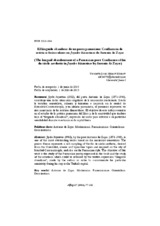El lánguido abandono de un poeta parnasiano: Confluencia de estéticas finiseculares en Joyeles bizantinos de Antonio de Zayas
The languid abandonment of a Parnassian poet: Confluence of fin du siècle aesthetic in Joyeles bizantinos by Antonio de Zayas
Autor
Nebot Nebot, Vicente José
Editor
UCOPressFecha
2015Materia
Zayas, Antonio deModernismo
Parnasianismo
Orientalismo
Decadentismo
Zayas, Antonio de
Modernism
Parnassianism
Orientalism
Decadentism
METS:
Mostrar el registro METSPREMIS:
Mostrar el registro PREMISMetadatos
Mostrar el registro completo del ítemResumen
Joyeles bizantinos (1902), del poeta Antonio de Zayas (1871-1945), constituye una de las obras más singulares de la renovación modernista. Desde la temática orientalista, islámica y bizantina e inspirada en la ciudad de Estambul-Constantinopla, y un ideario parnasiano, el poemario representa un rico muestrario de las estéticas finiseculares. El objetivo de este trabajo consiste en el estudio de la poética parnasiana del libro y de la emotividad que trasluce bajo el “lánguido abandono”, expresión del autor para referirse a su particular sensibilidad durante su estancia en la capital turca. Joyeles bizantinos (1902), by the poet Antonio de Zayas (1871-1945), is one of the most outstanding works based on the modernist renovation. The poems theme represents a rich sampling of the fin de siècle aesthetic, derived from the Orientalist, islamic and byzantine topics and inspired on the city of Istanbul-Constantinople, and also on the Parnassian style. The objective of this work is the study of the Parnassian poetry expressed in the book and the study of the emotions which could be revealed by the written expression “lánguido abandono”, made by the author in order to communicate his particular sensitivity during his stay in the Turkish capital.

